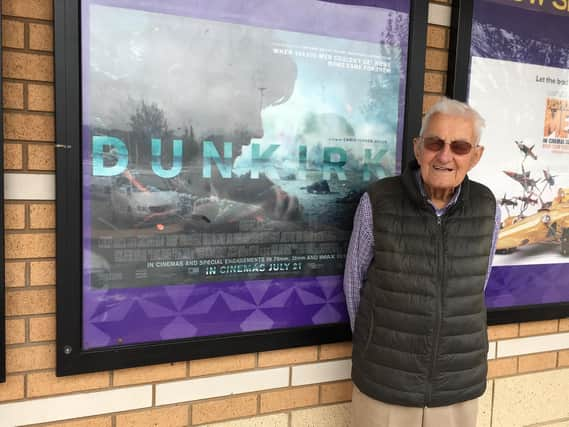75 years since VE Day: An account of the war from a Rugby Dunkirk hero


It's usually just a quirk of the memory that we often remember the first things we did, and in this case Mr Salisbury was one of the first people I interviewed when I began working for the Advertiser in 2017.
But whether he'd been the first or the thousandth person I spoke with, I have no doubt I would remember my chat with Mr Salisbury.
Advertisement
Hide AdAdvertisement
Hide AdMy shorthand notes from our chat are safely stowed in a drawer, but I enjoyed speaking with him so much that I'm quite sure I could still write a fairly accurate account of what he said without referring to any of records.
But, in the pursuit of not wanting to miss anything, here is the original story in full, taken from our archives.
This story was originally published in August 2017
A Rugby veteran has been reminded of his dramatic escape from the beaches of Dunkirk in 1940 after seeing Christopher Nolan’s film.
Wilfred John Salisbury, who was born in Rugby in 1917 and now lives on Kingsley Avenue, saw the film Dunkirk at Rugby Cineworld with his son.
Advertisement
Hide AdAdvertisement
Hide AdMr Salisbury, who goes walking twice a week and still enjoys an occasional glass of whisky, joined the Territorial Army before the war while working at the family business, Salisbury’s Fruiterers.
When war broke out in 1939 he was mobilised as a signaller in the artillery as part of the BEF (British Expeditionary Force) and sent to Belgium.
He said: “When we got there it was chaos. There were no billets, so we had to find somewhere to sleep on our own. A woman found a place for us near a farm.”
Mr Salisbury was then stationed near Waterloo.
He said: “We were kept in ignorance most of the time, we didn’t know much about Hitler and the Nazis – we just did what we were told to do. We couldn’t get hold of newspapers, the only news we got was letters from home, but we could only get those sometimes.”
Advertisement
Hide AdAdvertisement
Hide AdWhen the German military broke through into France in May 1940 it took just six weeks to sweep through the country, rapidly forcing parts of the BEF towards Dunkirk.
Mr Salisbury said the BEF was overwhelmed by the attack. His unit had to blow up equipment to stop it falling into the hands of the Germans, but he kept hold of his rifle until he arrived in England.
He said: “I don’t think they knew back home what was going on. We walked past a lot of equipment that had been blown up. It wasn’t just soldiers, there were women and families walking with us to escape the Germans.”
When Mr Salisbury arrived on the beach at Dunkirk, he and his friends realised it would be deadly to stay there.
Advertisement
Hide AdAdvertisement
Hide AdHe said: “We weren’t on the beach very long, when we arrived it was chaos, I saw what was going on and thought: ‘I’m not waiting for a boat.’ If you see the film, you’ll see why I wanted to get off the beach.
“A sergeant who could see what was going on went round all of us and said we should march up the road and find something to get us back home to England. We marched for about 10 miles and found two destroyers that were taking on French and British soldiers.
“As we got on-board we were being dive-bombed and there was an anti-aircraft gun on the destroyer firing. We came back for more people a few times before we got back to England.”
He was then taken by train across the country, passing through Rugby and stopping at Swindon.
Advertisement
Hide AdAdvertisement
Hide AdHe said: “We went through Rugby and I remember hoping we would stop there, but the train carried on.
“When we got off the train it was daylight. They said if we wanted to go home we could.
“I got on the phone and called my father at the shop because my family didn’t know whether I was alive - my father said he would come and bring me home.”
Not many people had cars, but Mr Salisbury’s father owned one he used for the shop, so he told him he would come as soon as he could.
Advertisement
Hide AdAdvertisement
Hide AdMr Salisbury was then told he would not be allowed to go home as not all soldiers had been accounted for – he was given permission to go home the following morning.
Mr Salisbury, who married while on leave in 1942, served in South Africa before taking part in the Italian campaign, where he was involved with the fighting at Salerno and Monte Cassino, among many more places.
With all his brothers serving in the war, Mr Salisbury said he was brought home in 1944 after the government decided family-run businesses should not be left without anyone to assist in their running.
He said: “I came back to the shop and found nearly everything was rationed. There were queues everywhere – if anything was for sale, there was a queue.”
Advertisement
Hide AdAdvertisement
Hide AdMr Salisbury went on to run Salisbury’s Fruiterers on Clifton Road until he retired aged 70.
His son, Paul Salisbury, 69, said: “He’s not an old 99 years, he still drives and he regularly reads the Times cover to cover, even completing the crossword.”
Mr Salisbury celebrated his centenary birthday in November 2017.